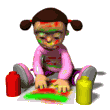
Developmental Cognitive Neuroscience Laboratory: Faculty Publications
Document Type
Article
Date of this Version
11-1-2005
Abstract
Assessment of the overarching self-regulatory mechanisms, or executive functions, in any age group is challenging, in part due to the complexity of this domain, in part due to their dynamic essence, and in part due to the inextricable links between these central processes and the associated domain-specific processes, such as language, motor function, and attention, over which they preside. While much progress has been made in clinical assessment approaches for measuring executive functions in adults and to some extent in adolescents and school-aged children, the toolkit for the preschool evaluator remains sparse. The past decade, however, has seen a substantial increase in attention to executive functions in very young children from a developmental neuropsychological perspective. With this has come a necessity for better, more specific, and more internally valid performance measures, many of which are now described in the experimental literature. Few such tasks, however, have adequately demonstrated psychometric properties for clinical application. We present two performance tasks designed to tap selective aspects of executive function in preschoolers that are emerging from the experimental laboratory and hold promise of appropriate reliability and validity for the clinical laboratory. Performance tests alone, however, are insufficient to develop a comprehensive picture of a child's executive functioning. Thus, we present a rating scale of preschoolers' executive function in the everyday context, and advocate a model of executive function assessment that incorporates both controlled performance tasks that target specific aspects of executive function and parent/teacher ratings that target more global aspects of self-regulation in the everyday context.


Comments
Published in Mental Retardation and Developmental Disabilities Research Reviews 11 (2005), pp. 209–215; doi: 10.1002/mrdd.20075 Copyright © 2005 Wiley-Liss, Inc. Used by permission. http://www.interscience.wiley.com